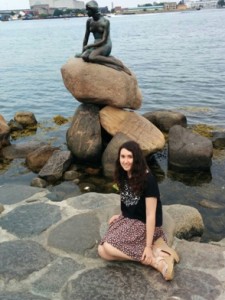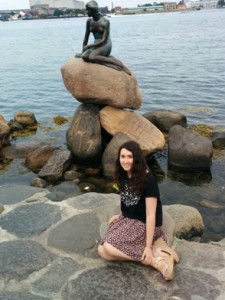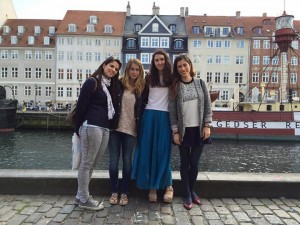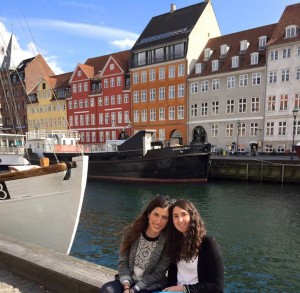

Maturità 2013. La professoressa chiede: “E allora, cosa andrai a studiare adesso?”
Quando arriva il momento di questa domanda, significa una cosa sola: l’esame di maturità è finito. Finalmente mi sento serena, libera e felicissima di essere finalmente in vacanza.
- Già , ma cosa rispondo alla domanda?
- Dunque, sono ancora indecisa tra Giurisprudenza, Medicina, e Scienze geografiche per l’Ambiente e la Salute.
Ebbene sì, questa è stata la mia esitante risposta. Ho certamente lasciato i professori stupiti, ma quella risposta rifletteva la confusione che avevo in mente. Purtroppo però il tanto atteso periodo di libertà dopo gli esami è divenuto altrettanto stressante in quanto la mia incertezza cresceva di giorno in giorno.
Sorprendentemente però un solo pomeriggio è bastato a farmi capire dove volessi studiare e cosa.
L’OPEN HOUSE - Sono, infatti, venuta all’ Open House della John Cabot e in quel pomeriggio tutte le mie incertezze sono svanite. Era qui che volevo studiare. E tra tutti i corsi di laurea offerti, quello di Affari internazionali più mi aveva colpito. Cos’è che mi ha convinto così in fretta?
INTERNAZIONALITÀ - In primo luogo, sono stata catturata dall’ internazionalità dell’ambiente universitario. Quale posto migliore per imparare a conoscere culture diverse e per studiare le problematiche globali, se non qui, dove le classi stesse sono una piccola riproduzione di questo mondo globale? Trovarsi seduti accanto ad un ragazzo statunitense, una ragazza russa e un ragazzo egiziano e poter interagire con loro, aiuta a sviluppare una prospettiva unica che arricchisce più di quanto si possa apprendere dai libri.
STUDIO IN INGLESE - In più, avrei studiato tutto in inglese. Oltre al vantaggio di poter migliorare la lingua, avrei imparato i termini più tecnici e specifici direttamente in inglese. Ad esempio non essendo l’italiano una delle sei lingue ufficiali dell’ONU, studiare la sua struttura e i vari organi direttamente in inglese è affascinante in quanto mi dà l’impressione di esserci in qualche modo più vicina.
INTERDISCIPLINARIETÀ - Infine, scegliendo di studiare qui non avrei dovuto accantonare definitivamente il mio interesse per gli studi giuridici, ma allo stesso tempo avrei potuto affrontare tutto da una prospettiva più ampia che mi avrebbe permesso di approfondire anche il settore economico e quello strettamente politico. Mi capita spesso di uscire da una classe di macroeconomia o di politica e di sorprendermi di quanto questi due campi siano interconnessi più di quanto si possa immaginare.
Sono qui ormai da tre anni, e ogni giorno mi convinco sempre di più di aver intrapreso la scelta giusta. Se, infatti, avessi la possibilità di tornare indietro farei di nuovo la stessa scelta e quel giorno di luglio alla fine del colloquio orale avrei invece risposto con convinzione: - Studierò Affari Internazionali alla John Cabot University- con un grande sorriso in volto.
Studying International Affairs at John Cabot: A Happy Ending
During my high school final exam (the so-called Maturità) in 2013 my professor asked: “So, what will you study in college?”
Getting asked this question meant that exams were finally coming to an end. I was almost ready to relax, be carefree start planning a well-deserved vacation!
-Right, but what’s the answer to the question?
-Is it going to be Law, Medicine or Science?
Well, I didn’t really know what to answer, so I mentioned all three subjects I was interested in. My professor looked surprised, but that was the reality of it: I was confused. This longed-for moment of closure with my high school years meant I was faced with a lot of uncertainty about my future, and this was growing day by day.
Unbelievably, though, it only took one afternoon to help me find the answer to the dreaded question.
I attended John Cabot’s Open House and I understood that this was the place where I wanted to be. Of all the degree programs offered at John Cabot, International Affairs struck me as just right for me. What made me make up my mind so quickly?
International Atmosphere: First of all, I was amazed by how international John Cabot was. What better place to learn about different cultures and global issues than at JCU, where every class is a microcosm of the global world? Sitting in class next to students from the U.S., Russia, Egypt –just to mention a few—and interacting with them on a daily basis helps you develop an understanding of international affairs that you just can’t get from books.
English Proficiency. On top of everything, JCU would mean studying in English and becoming perfectly proficient in the most important language used in international affairs.
Interdisciplinary Approach. Studying at JCU means I can pursue my original interests in more than one area and have a broad approach to my studies. International Affairs in fact is a perfect example of an interdisciplinary subject area, because it combines politics, law, economics and history. I often walk out of a class in macroeconomics or politics and realize how these two fields are closely related.
I have been at JCU for three years and every day I am more and more convinced that I made the right choice. If I had to do it all over again I would take the same decision. And then I would know exactly how to answer when asked: what do you want to study in college.







